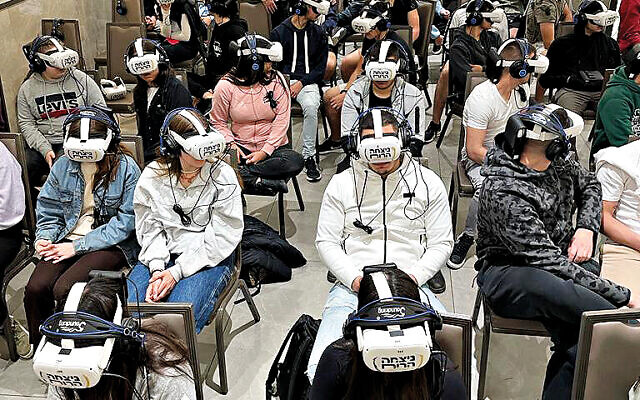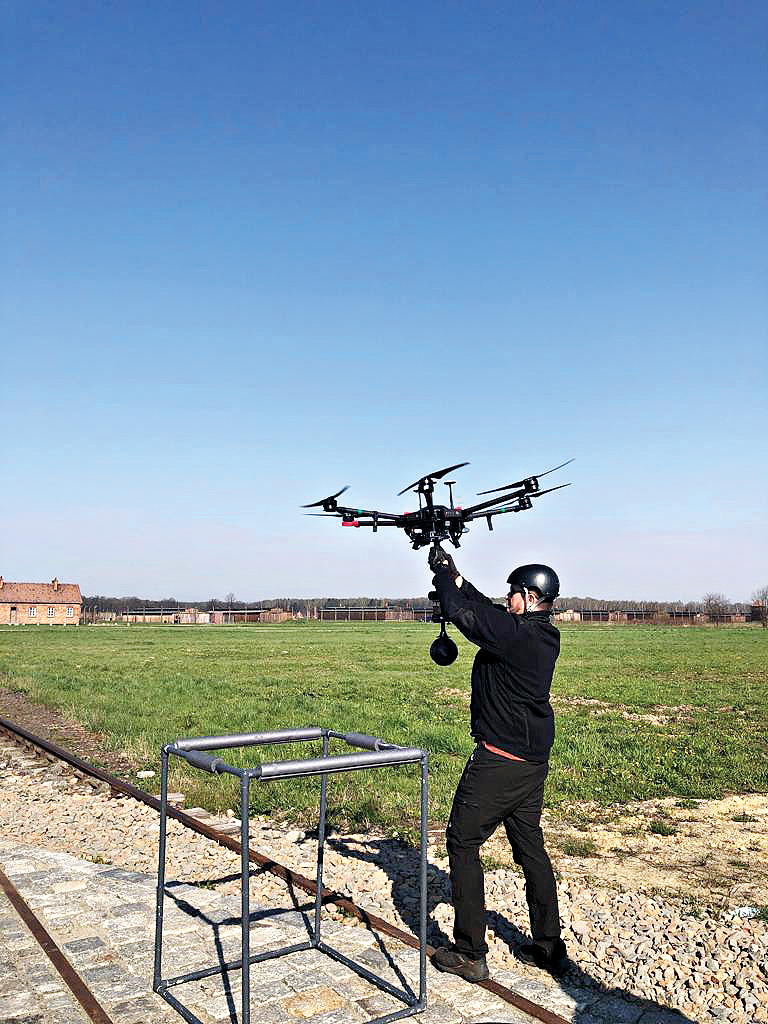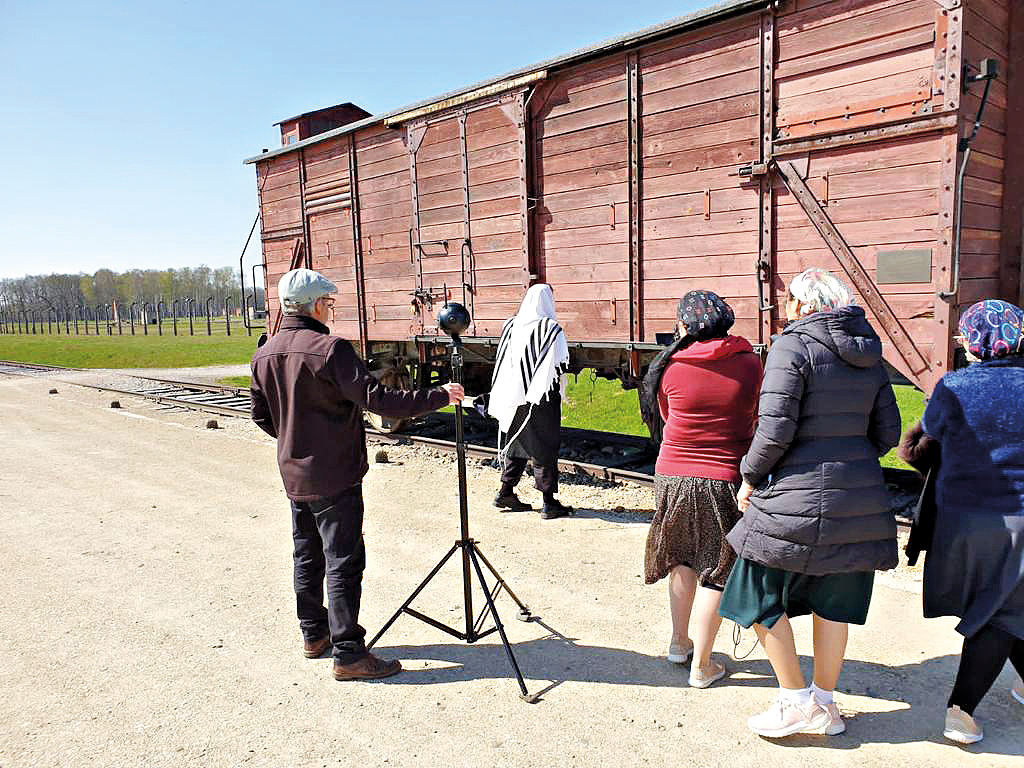Charedi women bring the horrors of Auschwitz to new audiences through VR
A Triumph of Spirit is an immersive film that offers 360-degree views of the interior of the death camp while a historian guides the viewer around.
Michael Daventry is Jewish News’s foreign and broadcast editor

For many young Israelis, a trip to Poland to visit the Auschwitz concentration camp is an experience that shapes their adult lives and puts their very existence in context.
Miriam Cohen could not go. She felt left out, and wanted to do something about it.
“I’m a Jewish, very Orthodox person, and in the religious community in Israel we don’t go to Poland when we are 17. All [other] Israelis do go,” she recounted with a small smile.
“I remember I saw all the kids that were my age when I was 17 going and I couldn’t go because I’m religious. And I remember it was very, very tough for me because they came back with this experience that changed their life and I felt like it wasn’t fair.”
She never forgot that teenage experience – which is why she resolved as an adult, now working with filmmaker colleagues, to try and document the Nazi death camp for people who cannot or will not visit it.
The result is A Triumph of Spirit, an immersive film that offers 360-degree views of the interior of Auschwitz while a historian guides the viewer around.

Jewish News watched the movie while sitting in a beachfront Tel Aviv café. It made for a jarring experience to put on a virtual reality headset and be transported, instantly, from the blazing sunshine into the darkness of an abyss.
The interior of Auschwitz will be chillingly familiar to anyone who has visited, but of course this is a film aimed at a Charedi audience – many of whom will not have been there before.
Its presenter is the historian and researcher Yisrael Goldwasser, a camp guide, who gesticulates and points as he takes viewers around the perimeter and into the depths of the camp.
Yet even getting to the stage of filming it was a challenge.
Auschwitz was closed during successive coronavirus-induced lockdowns and its custodians are highly reluctant to permit filming even when there isn’t a pandemic raging.
But after months of negotiations, the camp was opened for three days to allow the team to film. It was the first time Cohen and her colleagues got to visit.
“You know, we are three mothers, so a lot of babies [between us]. My colleague Chani has nine, Yuti has seven kids, I was pregnant with my sixth. We’re over there, alone.”
She paused as she remembered. “We crashed. It was very hard. It was incredible and terrible at the same time. So we tried to put that feeling into the movie.”

Audiences across Israel, most of them Charedi, have now watched the film and there are plans to bring it to the UK.
But how did the Israeli viewers respond?
“First of all, they cried a lot. One of the things I hear the most is: ‘Why didn’t you give us tissues?’ They cry, they feel like they’re connecting to something very, very big and very, very strong. They feel a part of Am Yisrael.
“If we’re talking about religious girls, none of them watch movies. They don’t watch Holocaust movies, or stuff like this. They only read about the Holocaust and they imagine. And when they see this movie, suddenly their imagination and all they read about – it gets a form.”
Many Holocaust survivors have watched it and, Cohen said, are universal in their response: there are many tears, but they fiercely reject offers to stop the film and take the VR headset away. One survivor gave her an instruction: “She told me, ‘I want you to promise that you’re going to try to do whatever you can to show it to the most people you can’. I told her I would. I have this promise to fulfil.”

Thank you for helping to make Jewish News the leading source of news and opinion for the UK Jewish community. Today we're asking for your invaluable help to continue putting our community first in everything we do.
For as little as £5 a month you can help sustain the vital work we do in celebrating and standing up for Jewish life in Britain.
Jewish News holds our community together and keeps us connected. Like a synagogue, it’s where people turn to feel part of something bigger. It also proudly shows the rest of Britain the vibrancy and rich culture of modern Jewish life.
You can make a quick and easy one-off or monthly contribution of £5, £10, £20 or any other sum you’re comfortable with.
100% of your donation will help us continue celebrating our community, in all its dynamic diversity...
Engaging
Being a community platform means so much more than producing a newspaper and website. One of our proudest roles is media partnering with our invaluable charities to amplify the outstanding work they do to help us all.
Celebrating
There’s no shortage of oys in the world but Jewish News takes every opportunity to celebrate the joys too, through projects like Night of Heroes, 40 Under 40 and other compelling countdowns that make the community kvell with pride.
Pioneering
In the first collaboration between media outlets from different faiths, Jewish News worked with British Muslim TV and Church Times to produce a list of young activists leading the way on interfaith understanding.
Campaigning
Royal Mail issued a stamp honouring Holocaust hero Sir Nicholas Winton after a Jewish News campaign attracted more than 100,000 backers. Jewish Newsalso produces special editions of the paper highlighting pressing issues including mental health and Holocaust remembrance.
Easy access
In an age when news is readily accessible, Jewish News provides high-quality content free online and offline, removing any financial barriers to connecting people.
Voice of our community to wider society
The Jewish News team regularly appears on TV, radio and on the pages of the national press to comment on stories about the Jewish community. Easy access to the paper on the streets of London also means Jewish News provides an invaluable window into the community for the country at large.
We hope you agree all this is worth preserving.





















